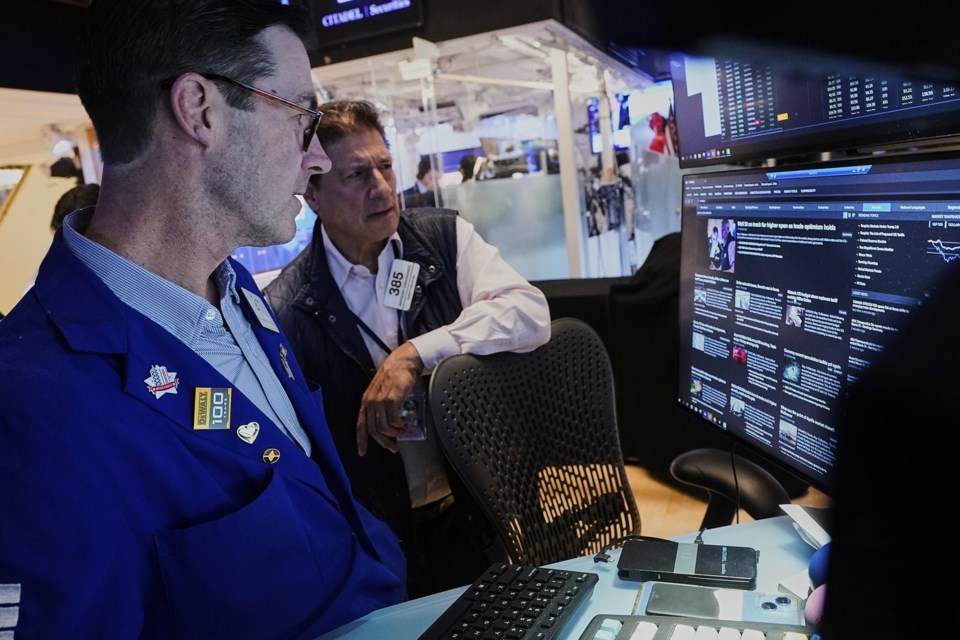NEW YORK (AP) — U.S. stocks closed out another strong week on a positive note. The S&P 500 rose 0.7% Friday, its fifth gain in a row and bringing its gain for the week to 5.3%. It was the third week of solid gains in the last four. The Dow Jones Industrial Average added 0.8%, and the Nasdaq composite climbed 0.5%. Stocks rallied this week after the United States and China agreed on a 90-day pause for most of their punishingly high tariffs, while encouraging reports on inflation have raised hopes the Federal Reserve can cut interest rates later this year if the economy falters.
THIS IS A BREAKING NEWS UPDATE. AP’s earlier story follows below.
NEW YORK (AP) — Wall Street is cruising Friday toward the finish of a strong week as U.S. stocks glide closer to the all-time high they set just a few months earlier, though it may feel like an economic era ago.
The S&P 500 was up 0.6% in late trading and heading for a fifth straight gain. It’s on track for a 5.1% rise for the week, which would be its third winning week in the last four, as hopes build that President Donald Trump will lower his tariffs against other countries after reaching trade deals with them. Such hopes have driven the S&P 500 back within 3.2% of its record set in February after it briefly dropped roughly 20% below the mark last month.
The Dow Jones Industrial Average was up 296 points, or 0.7%, with an hour remaining in trading, and the Nasdaq composite was 0.4% higher.
Trump’s trade war had sent financial markets reeling worldwide because of twin dangers. On one hand, tariffs could slow the economy and drive it into a recession. On the other, tariffs could push inflation higher.
But this week featured some encouraging news on both fronts. The United States and China announced a 90-day stand-down in most of their punishing tariffs against each other, while a couple reports on inflation in the United States came in better than economists expected.
It was “a week to remember,” according to economists at Bank of America led by Claudio Irigoyen and Antonio Gabriel. But they also said they're not expecting a significant drop in volatility, and they're not changing big-picture forecasts.
“There is still huge uncertainty regarding the impact of tariffs on economic activity and inflation,” they said in a BofA Global Research report.
That uncertainty has been hitting U.S. households and businesses, raising worries that they may freeze their spending and long-term plans in response, which would hurt the economy. The latest reading in a survey of U.S. consumers by the University of Michigan showed sentiment soured again in May, though the pace of decline wasn't as bad as in prior months.
Perhaps more worryingly, expectations for coming inflation keep building, and U.S. consumers are now bracing for 7.3% in the next 12 months, according to the University of Michigan's preliminary survey results. That's up from a forecast of 6.5% a month before.
When everyone expects inflation to be high, it could kick off a vicious cycle of behavior that only worsens inflation.
To be sure, only some of the University of Michigan's survey responses for the preliminary May reading came after the United States and China announced their 90-day truce.
On Wall Street, Charter Communications rose 1.8% after it said it agreed to merge with Cox Communications in a deal that would combine two of the country’s largest cable companies. The resulting company will change its name to Cox Communications and keep Charter’s headquarters in Stamford, Connecticut.
CoreWeave jumped 26% after Nvidia disclosed that it had increased its ownership stake in the company, whose cloud platform helps customers running artificial-intelligence workloads. Nvidia now owns 7% of CoreWeave, up from its nearly 6% stake before its initial public offering of stock in March.
Novo Nordisk’s stock that trades in the United States fell 1.8% after the Danish company behind the Wegovy drug for weight loss said that Lars Fruergaard Jørgensen will step down as CEO and that the board is looking for his successor. The company cited “recent market challenges” and how the stock has been performing recently.
In the bond market, Treasury yields were holding relatively steady.
The yield on the 10-year Treasury eased to 4.43% from 4.45% late Thursday and from more than 4.50% the day before that. Lower bond yields can encourage investors to pay higher prices for stocks and other investments.
The two-year Treasury yield, which more closely tracks expectations for action by the Federal Reserve, inched up to 3.97% from 3.96%. It had been as low as 3.93% earlier in the morning, before the release of the University of Michigan's survey.
Hope remains that this week’s better-than-expected signals on inflation could give the Federal Reserve more leeway to cut interest rates later this year if high tariffs drag down the U.S. economy.
In stock markets abroad, indexes were mixed in Asia and higher in Europe.
Tokyo’s Nikkei 225 inched down by less than 0.1% after the government reported that Japan’s economy contracted at a faster rate than expected in the first quarter of the year.
___
AP Writers Jiang Junzhe and Matt Ott contributed.
Stan Choe, The Associated Press




